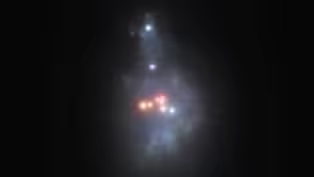
PolitiFact's 'Lie of the Year' and impact on Ohio town
Clip: 12/25/2024 | 7m 2sVideo has Closed Captions
PolitiFact's 'Lie of the Year' and its impact on the Ohio town caught in the middle
The 2024 campaign was unlike any in modern American history. But one thing united candidates across the political spectrum, they were all searching for messages that would resonate with voters. The team at the fact-checking organization PolitiFact investigated hundreds of claims to separate fact from fiction. As Ali Rogin reports, one comment stood out as PolitiFact’s 2024 Lie of the Year.
Problems playing video? | Closed Captioning Feedback
Problems playing video? | Closed Captioning Feedback
Major corporate funding for the PBS News Hour is provided by BDO, BNSF, Consumer Cellular, American Cruise Lines, and Raymond James. Funding for the PBS NewsHour Weekend is provided by...

PolitiFact's 'Lie of the Year' and impact on Ohio town
Clip: 12/25/2024 | 7m 2sVideo has Closed Captions
The 2024 campaign was unlike any in modern American history. But one thing united candidates across the political spectrum, they were all searching for messages that would resonate with voters. The team at the fact-checking organization PolitiFact investigated hundreds of claims to separate fact from fiction. As Ali Rogin reports, one comment stood out as PolitiFact’s 2024 Lie of the Year.
Problems playing video? | Closed Captioning Feedback
How to Watch PBS News Hour
PBS News Hour is available to stream on pbs.org and the free PBS App, available on iPhone, Apple TV, Android TV, Android smartphones, Amazon Fire TV, Amazon Fire Tablet, Roku, Samsung Smart TV, and Vizio.
Providing Support for PBS.org
Learn Moreabout PBS online sponsorshipWILLIAM BRANGHAM: It's safe to say the 2024 campaign cycle was unlike any in modern American history.
The team at the fact-checking organization PolitiFact investigated hundreds of claims made this year by political figures to separate fact from fiction.
As Ali Rogin reports, one comment stood out as PolitiFact's 2024 Lie of the Year.
ALI ROGIN: It was the claim heard round the world, watched by an audience of more than 67 million people during September's presidential debate, and raided Pants on Fire by PolitiFact.
DONALD TRUMP, Former President of the United States (R) and Current U.S. President-Elect: In Springfield, they're eating the dogs, the people that came in.
They're eating the cats.
They're eating -- they're eating the pets of the people that live there.
And this is what's happening in our country, and it's a shame.
ALI ROGIN: Those untrue comments set off a firestorm on the campaign trail and had a profound impact on the residents of Springfield, Ohio.
Now it's been named Lie of the Year.
Katie Sanders is the editor in chief of PolitiFact and joins me now.
Katie, thank you so much for being here.
First of all, is there any kernel of truth to this?
And, also, how does PolitiFact determine whether something is an outright and deliberate lie versus other types of untruths?
KATIE SANDERS, Editor in Chief, PolitiFact: When Trump and Senator J.D.
Vance were asked about this lie and they were asked to defend it, as so many officials and journalists were saying there was no evidence to support it, they kept talking about reports they heard from television in Trump's case or from constituents in the Ohio senator's case.
And they basically said, that is enough for us to make this claim.
It's enough of a basis.
But people make reports to police and other agencies all the time.
And that just prompts an investigation.
That doesn't mean that something actually happened.
And Trump and Vance were circulating screenshots of allegations and police calls that were about geese, not people's pets, that were later taken back by the people who made them, who told journalists they regretted it.
J.D.
Vance even acknowledged that these reports he was hearing from his constituents might turn out to be false.
But, when they did, when they turned out to be empty, he just kept defending the lie anyway, saying he could do that to bring attention to Springfield's immigration experience.
So, when you ask what separates a lie from a false claim, we only use the word lie once a year for Lie of the Year.
We avoid it most of the time because of the intentionality.
It's very hard to sort out whether people are intentionally trying to deceive with a false claim.
But I think, here, it was pointed out again and again and again that there was no evidence to support a claim that sounds truly shocking and was said on the campaign's biggest stage.
And they just continued to repeat it and defend it.
ALI ROGIN: It's easy to get caught up in the rhetorical battle and the high emotions that certainly the immigration debate spurs.
But, of course, in Springfield itself, there were real consequences for the people living there.
There were bomb threats made.
Haitian migrants were fearing for their lives.
What was the impact of this lie on the city of Springfield and the people there?
KATIE SANDERS: It was far-reaching.
You had the tangible effects with the bomb threats and evacuations of schools, city buildings, grocery stores, other places.
That caused a lot of upheaval in the days after the debate, when Trump basically marked the town.
But then you have kind of the emotional toll.
We spoke to one business owner who was Haitian whose son asked him point blank, "Dad, do we eat dogs and cats?"
because he had been teased at school.
We talked to bilingual specialists, who said that they would tell students during evacuations that they were going on a field trip, but really they were leaving their building out of fear and safety.
So there was just a lot of chaos.
Some of that has, of course, simmered, but you still have a population that was singled out during the campaign, singled out for deportations, even though they have a temporary protected status even by the incoming administration.
So there's still a lot of fear.
ALI ROGIN: This undoubtedly fired up the Trump campaign and its supporters.
We know how this movie ends.
President Trump won the election.
But what impact did this moment and this lie have on this race?
KATIE SANDERS: I think you said it well at the beginning of the segment, that it was the claim heard around the world.
It really did have that shock value that president-elect Trump would take something that was really Internet hearsay and declare it as truth on the most prominent stage of the campaign.
So it had that shock value.
But, even more so, it really became something they stuck to and that made it even more remarkable.
You can show all of the evidence that something is baseless, not supported, and just have a really successful and prominent candidate not accept it.
And it also had effects.
When people were polled after the debate on whether they believed Trump, a sizable share of Republicans, and even some independents said they believed it was true because he was saying it.
ALI ROGIN: This isn't the first time President Trump has ended up on a PolitiFact's list, started in 2015.
His words made an appearance when he downplayed the impact of COVID-19, yet again when he downplayed the significance of the January 6 attack on the U.S. Capitol.
Many of these lies continue to be repeated each year, even though they have been repeatedly debunked.
So what does that say about the American relationship with the truth these days, when something can be repeated enough that it just becomes part of the discourse, even though it's been roundly shown to not be true?
KATIE SANDERS: It has been a recurring theme in the last decade that he has been a contender or a winner or a co-winner of this award.
There's just no changing that with the frequency and kind of the casual nature that he brings up claims that are new and untrue or repeated or untrue.
At the end of the day, I think that people make their decisions for a lot of reasons.
And I think a lot of people do value the information that reporters and journalists like ours put out, even if that doesn't factor into their choice.
I think people are really driven by their emotions, how they feel about hot-button issues on the economy or immigration.
And so I just think that people have a lot of motivations.
It's really telling that there can be a lot of success, even if you aren't sticking to the truth.
ALI ROGIN: Katie Sanders, editor in chief of PolitiFact, thank you so much for your insights.
KATIE SANDERS: Thanks so much.
Boston Ballet offers a new look for 'The Nutcracker'
Video has Closed Captions
Clip: 12/25/2024 | 6m 4s | Boston Ballet offers a new look for Christmas classic 'The Nutcracker' (6m 4s)
Newly discovered galaxy could offer clues on Milky Way
Video has Closed Captions
Clip: 12/25/2024 | 6m 43s | How a newly discovered galaxy could offer clues on how our Milky Way Galaxy formed (6m 43s)
Northern Israel residents hesitant about returning home
Video has Closed Captions
Clip: 12/25/2024 | 5m 7s | Why Northern Israel residents are hesitant about returning home after 14 months of war (5m 7s)
What makes Bethlehem's Moravian settlements so unique
Video has Closed Captions
Clip: 12/25/2024 | 4m 52s | What makes Bethlehem, Pennsylvania's Moravian settlement so unique (4m 52s)
Providing Support for PBS.org
Learn Moreabout PBS online sponsorship
- News and Public Affairs

FRONTLINE is investigative journalism that questions, explains and changes our world.

- News and Public Affairs

Amanpour and Company features conversations with leaders and decision makers.












Support for PBS provided by:
Major corporate funding for the PBS News Hour is provided by BDO, BNSF, Consumer Cellular, American Cruise Lines, and Raymond James. Funding for the PBS NewsHour Weekend is provided by...



